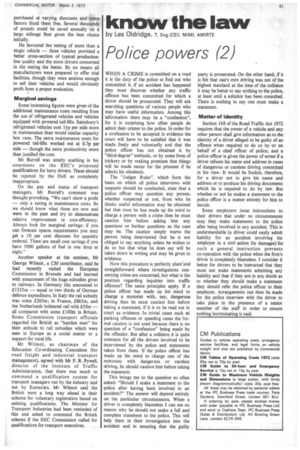know the law
Page 53

If you've noticed an error in this article please click here to report it so we can fix it.
by Les Oldridge, T. Eng.(CEI). MIMI. AMIRTE
Police powers (2)
WHEN A CRIME is committed on a road it is the duty of the police to find out who committed it, if an accident has happened they must discover whether any traffic offence has been committed for which a driver should be prosecuted. They will ask searching questions of various people who may have useful information. Among this information there may be a "confession", for it is surprising how often people do admit their crimes to the police. In order for a confession to be accepted in evidence the court will have to be satisfied that it was made, freely and voluntarily and that the police officer has not obtained it by "third-degree" methods, or by some form of trickery or by making promises that things will be made easier for the prisoner if he admits his niisdeeds.
The "Judges Rules", which form the basis on which all police interviews with suspects should be conducted, state that a police officer may question any person, whether suspected or not, from who he thinks useful information may be obtained but that once he has made up his mind to charge a person with a crime then he must caution him before asking him any questions or further questions as the case may be. The caution simply warns the person being interviewed that he is not obliged to say anything unless he wishes to do so but that what he does say will be taken down in writing and may be given in evidence.
Now this procedure is perfectly plain'and straightforward where investigations concerning crime are concerned, but what is the position regarding inquiries into traffic offences? The same principles apply. If a police officer has made up his mind to charge a motorist with, say, dangerous driving then he must caution him before taking a statement, if it is to be read out in court as evidence. In trivial cases such Ed parking offences or speeding cases the formal caution is not used because there is no question of a "confession" being made by the offender. But after a collision it is quite common for all the drivers involved to be interviewed by the police and statements taken from them. If the police officer has made up his mind to charge one of the motorists with dangerous or careless driving, he should caution him before taking the statement.
This brings me to the question so often asked: "Should I make a statement to the police after having been involved in an accident?" The answer will depend entirely on the particular circumstances. When a driver is completely blameless I can see no reason why he should not make a full and complete statement to the police. This will help them in their investigation into the accident and in ensuring that the guilty party is prosecuted. On the other hand, if it is felt that one's own driving was not of the highest standard at the time of the collision it may be better to say nothing to the police, at least until a solicitor has been consulted. There is nothing to say one must make a statement.




































































































